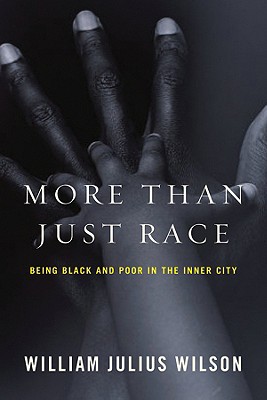More than Just Race-William Julius Wilson
My book this week is another nonfiction novel examining the issue of race relations in America, specifically the plight of the black and impoverished citizens of the American inner-city. In More than Just Race, sociologist William Julius Wilson attempts to identify the factors that contribute to the trend of joblessness, poverty, and non-nuclear family structures that characterize many poor urban areas.
Wilson talks about the previous research surrounding poverty among black Americans and is very clearly able to dissect what conclusions seem to stick, which are only partially supported by other research, and which don't seem to hold up beyond the confines of that single study. In the end, he arrives at the conclusion that black urban poverty is a mix of both structural factors (the way social positions, social roles, and networks of social relationships are arranged in our institutions, such as the economy, polity, education, and organization of the family) and cultural factors (factors related to the sharing of outlooks and modes of behavior among individuals who face similar place-based circumstances or have the same social networks).
Wilson talks about the previous research surrounding poverty among black Americans and is very clearly able to dissect what conclusions seem to stick, which are only partially supported by other research, and which don't seem to hold up beyond the confines of that single study. In the end, he arrives at the conclusion that black urban poverty is a mix of both structural factors (the way social positions, social roles, and networks of social relationships are arranged in our institutions, such as the economy, polity, education, and organization of the family) and cultural factors (factors related to the sharing of outlooks and modes of behavior among individuals who face similar place-based circumstances or have the same social networks).
Wilson's conclusions may be seen as offense to some, not only because he doesn't explicitly describe racism as a primary factor in the prevalence of black urban poverty, but because he includes black culture as a contributing factor, which many may perceive as racist in itself. However, these general descriptions of his content don't do the work he puts into the novel any justice. Wilson really does include racism as a factor, but breaks it down as a series of structural impediments to the success of impoverished black people (racism in hiring practices, negative perception of black men by employers, etc). Furthermore, he provides many compelling structural causes that could potentially contribute to black inner-city culture negatively affecting employment: in such, he is not "blaming the victim" like some may assume, but rather illustrating explicit injustices that black inner-city citizens have experienced that have given them a unique culture that does not always intertwine with the outside world. I hadn't heard this perspective before, and I enjoyed being exposed to the new theory.
I appreciated this book for Wilson's ability to synthesize research and make it accessible to non-sociologists and scholars. While it is repetitive at times (I definitely skimmed the end, which largely repeated earlier points) it was an insightful read.


This sounds like a very interesting perspective on black poverty in America. Although, many books attribute this to structural racism, this is the only book I know of to dare to point to the black inner city culture as a contributing factor.
ReplyDeleteSounds like a very interesting perspective. I'm intrigued.
ReplyDelete